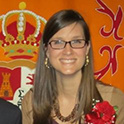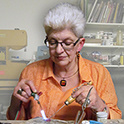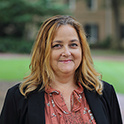
Erin Carlson
Department of Language, Literatures and Cultures
Each spring, the College of Arts and Sciences recognizes its undergraduate instructors who have exceeded the University of South Carolina’s standards for excellence in teaching.
This year, four outstanding faculty members — Erin Carlson, Mana Hewitt, Leslie Lovelace and James Risk — were named non-tenure track Undergraduate Teaching Award winners. The award comes with a $2,000 prize.
“This award honors professional faculty members who provide exceptional learning experiences to our undergraduate students, both within and outside the classroom,” says interim Dean Joel Samuels. “It is evident from not only the letters we received but also the entire nomination packet that [they] make a difference in the lives of [their] students.”

Department of Language, Literatures and Cultures
Erin Carlson has received consistently stellar student evaluations and peer assessments
as an instructor. She has developed innovative strategies for authentic language practice
and cultural interactions in her curriculum. And, perhaps most importantly, she has
helped students find value in and connect with the Spanish language.
Carlson pushes her students to engage with the Spanish-speaking community through
social media platforms such as TikTok and Instagram and by assigning virtual conversations
with native Spanish speakers. These interactions connect Carlson’s classroom instruction
to the real world.
Carlson has also published research in peer-reviewed academic journals and presented
her work at state and national conferences. She is completing her doctoral dissertation
on engaging language learners with global cultural competencies and shared responsibilities — research
that she puts into practice in her courses.
“Professor Carlson possesses both a unique dedication to her students and an excellence
in teaching that come out of her long experience in education and her groundbreaking
research in pedagogy,” says Rebecca Janzen, assistant professor of Spanish and comparative
literature. “I am privileged to count her as a colleague.”

School of Visual Art and Design
Mana Hewitt teaches students how to stretch themselves across media and material and
apply their skills to solve problems. To her, art develops critical thinking skills.
She incorporates art history, analysis and criticism into her curriculum.
“As an instructor of art, I believe it is my duty to educate and equip my students
with the knowledge, vocabulary and inquisitiveness of a serious art student,” Hewitt
says.
Along with her 15 years as director of the McMaster Gallery, Hewitt has designed and
developed several courses that reach across curriculums to attract students from outside
of the visual arts program. ARTE 101, for instance, draws hundreds of students each
semester. Hewitt has also redesigned and resurrected three jewelry-making courses,
which appeal to students in fields such as biology and engineering looking to improve
their motor skills.
“Professor Hewitt is one of the best professors I have ever had,” a former student
says. “It was such a privilege to be able to have her as a teacher at UofSC. She loves
what she does, and it was obvious through her enthusiasm and willingness to get students
engaged in the material.”

Department of Chemistry and Biochemistry
Leslie Lovelace has as much impact outside the classroom as inside of it. As the department’s
director of undergraduate studies and a full-time instructor, Lovelace is an excellent
resource for her department. Her engaging, personable and approachable teaching style
shows in her appreciation for her students.
“She embodies the dedication, advocacy, work ethic and caring of an instructor and
educator who makes the largest impact on our undergraduate program,” organic chemistry
professor and recent department chair Ken Shimizu says. “She cannot turn away any
student asking for help to try to fix an inequity or tackle systemic problems with
our curriculum.”
Outside the classroom, Lovelace has a powerful sense of empathy and feels a responsibility
to prepare her students not only for their next set of courses but their future beyond
graduation. She was the driving force behind redesigning the undergraduate laboratories
to provide safe face-to-face experiences during social distancing restrictions.
“What sets her apart is her singular focus on improving the educational experience
for all undergraduate students taking chemistry and biochemistry courses and her effectiveness
in convincing and organizing faculty and students to implement these improvements,”
Shimizu says.

Department of History
James Risk sums up his teaching philosophy by quoting the poet Robert Frost: “I am
not a teacher, but an awakener.” Risk seeks first to awaken his students’ natural
curiosity. He guides students away from memorizing names, dates and places and steers
them toward critical analysis of the past.
Students learn how history is relevant to life in modern society and how they are
actively part of history. The impacts of Risk’s lessons can linger for years. One
student wrote several years after taking one of Risk’s history classes: “Just know
that your lectures still linger in my brain and fuel my search for answers in and
to the greater picture. You’ve inspired me more than you know.”
“As a non-tenure track faculty member, it can be difficult to know your role within
the academic unit,” Risk says. “Being nominated for this award shows that my contributions
are not only valued, but they are recognized by others. Receiving the award showed
me that I had achieved what I had set out to do as a teacher and that I was part of
something much greater than any one individual.”